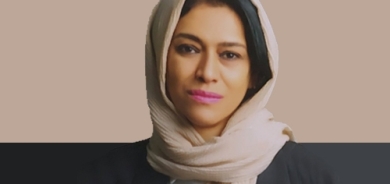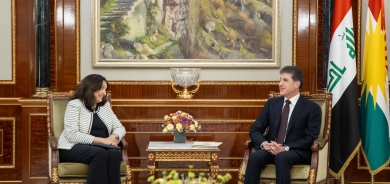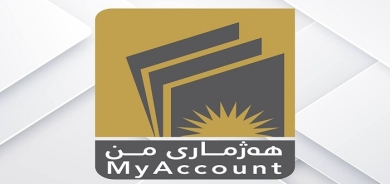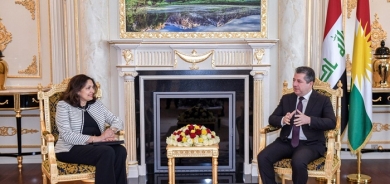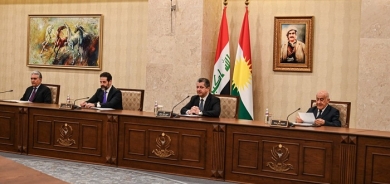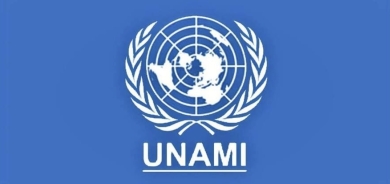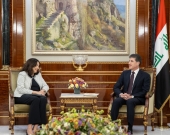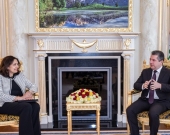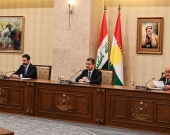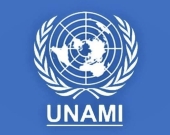Iraq PM threatens early elections to end deadlock
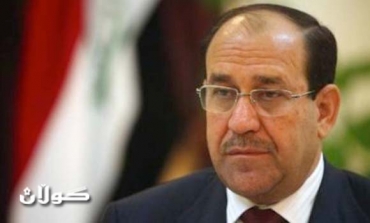
Prime Minister Nouri al-Maliki's gambit is the latest in a months-long political crisis in Iraq that has Shiites, Sunnis and Kurds alike calling for his resignation. The impasse also has fueled fears of a possible flare-up in violence by insurgents seeking to take advantage of the chaos. Bombings targeting a Shiite cleric and an anti-al-Qaida militia fighter killed at least 11 people Wednesday in Baghdad.
Al-Maliki, a Shiite, said continued refusals by his political opponents to negotiate a resolution to the crisis would leave him little choice but to call for a new vote.
"When the other party is refusing to sit down at the negotiating table and insists on the policy of creating continued crises ... then the prime minister finds himself obliged to call for early elections in which the Iraqi people will have the final say," al-Maliki said in a statement posted on his official website. He did not mention a date for the vote.
Al-Maliki's threat to hold snap elections comes in response to months of demands for his resignation by Sunni, Kurdish and some Shiite leaders who say he has sidelined them from power. It's unclear whether they have the political will or enough support in parliament to oust al-Maliki in a no-confidence vote.
The influential anti-American Shiite cleric Muqtada al-Sadr this week joined al-Maliki's opponents in calling for his resignation, raising the stakes against the prime minister.
By countering with a threat to call for early elections, al-Maliki is betting that his popular support nationwide would hand him a clear-cut victory and assure him undisputed executive authority.
The current crisis began in December when the government issued terrorism charges against the nation's highest-ranking Sunni politician, Vice President Tariq al-Hashemi, as the last U.S. troops were withdrawing from the country. That prompted Sunni politicians to briefly boycott the Cabinet, and government work grounded to a halt.
The standoff also has raised fears that insurgents could use the political chaos to try to reignite the sectarian animosities that drove Iraq to the brink of civil war five years ago.
On Wednesday, bombs targeting the Baghdad homes of a Shiite cleric and a member of a Sunni militia that fights al-Qaida killed at least 11 people. The attacks on two of al-Qaida's favorite targets brought Iraq's death toll for June to at least 186, making it the bloodiest month since January.
Al-Maliki's threat to hold snap elections is in part a response to al-Sadr's recent defection from the support base that put al-Maliki in power after 2010 elections failed to produce a clear winner. The prime minister has mentioned early elections previously as a possibility, and it's unclear whether he could convince a majority in parliament to agree to it.
Al-Maliki's media adviser, Ali al-Moussawi, said the prime minister still hopes to solve the crisis though dialogue.
The next parliamentary elections are scheduled for 2014. Under Iraq's constitution, a majority of parliament's 325 lawmakers must vote to dissolve the legislature to force new elections.
Sunni lawmaker Raad al-Dahlagi scoffed at al-Maliki's threat, saying the prime minister is trying to avoid making any reforms by "fleeing from solving the crisis by calling for early elections."
"Anyway, it's fine to have early elections," he said. "Who would win? It would be the same heads of blocs, the same faces who are in the field now."
Source: The Associated Press

